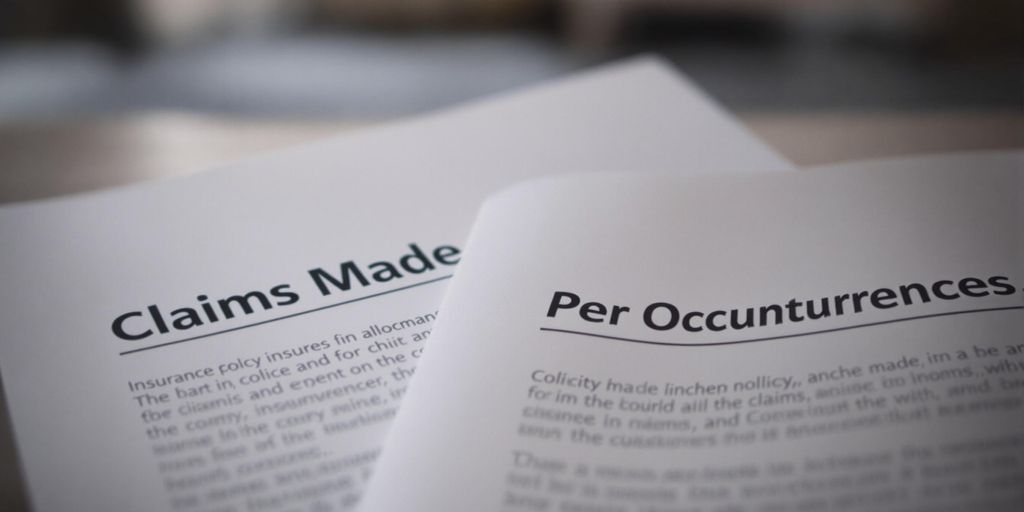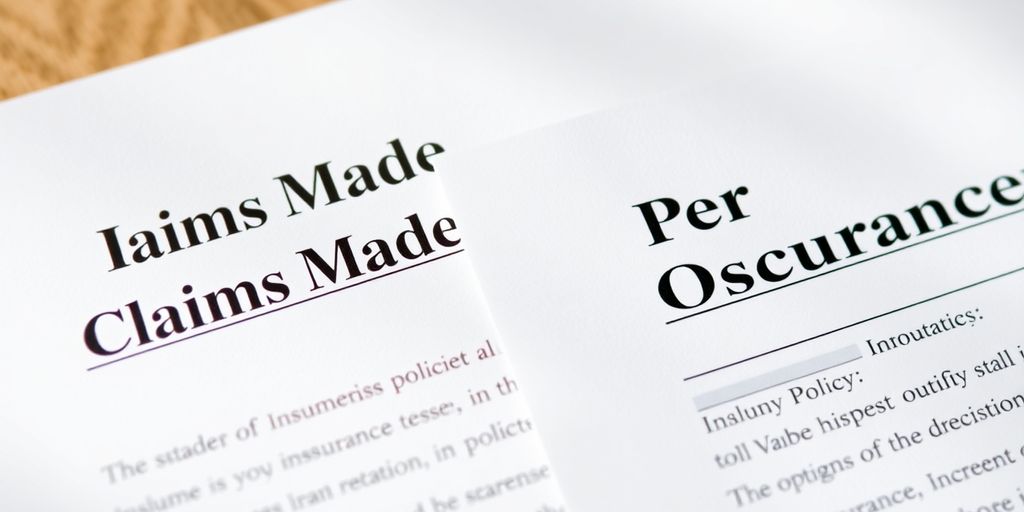What is the difference between claims made and per occurrence?

Insurance can be a tricky thing to wrap your head around, especially when it comes to understanding the differences between claims made and per occurrence policies. These terms might sound like insurance jargon, but they play a big role in how your coverage works. Whether you're a small business owner or just someone trying to figure out their personal insurance, knowing the difference is key. Let's break it down so you can make sense of it all.
Key Takeaways
- Claims made policies cover claims filed during the policy period, regardless of when the incident happened.
- Occurrence policies cover incidents that happen during the policy period, even if the claim is filed later.
- Claims made policies often require tail coverage to extend protection after the policy ends.
- Occurrence policies might have higher premiums but offer ongoing coverage for past incidents.
- Understanding your policy type helps manage expectations and coverage needs.
Understanding Claims Made Policies
What Is A Claims Made Policy Anyway?
Alright, let's dive into the world of claims made policies. Imagine you have a magic insurance shield that only works if you file a claim while it's active. That's pretty much how a claims made policy operates. It's only active when you make a claim during the policy period. If you forget to pay your premium or cancel your policy, poof, your magic shield disappears!
Here's the kicker: as long as the incident you're claiming for happened after a certain date (known as the retroactive date), you're covered. This is super common in professional liability insurance, like when doctors need malpractice insurance. It's like having a safety net for when things go wrong, but only if you remembered to set it up beforehand.
The Retroactive Date: Your Time Machine
Now, let's talk about the retroactive date. Think of it as your insurance policy's time machine. This date is crucial because it determines how far back in time your coverage can go. Got a claim for something that happened before this date? Sorry, your time machine won't go that far back. It's like trying to use a VHS tape in a Blu-ray player—just not gonna work.
Extended Reporting Period: The Tail That Wags
Ah, the extended reporting period, or ERP for short. This is like the tail that keeps wagging even after your policy has expired. It's a nifty feature that lets you report claims after your policy period ends, usually for an extra fee. So if something goes wrong right before your policy expires, you can still file a claim during this "tail" period. It's like having the last slice of pizza even after the party's over!
"With a claims made policy, timing isn't just everything—it's the only thing!"
So, there you have it! Claims made policies are all about timing, with a dash of time travel and a sprinkle of extra coverage to keep you protected, as long as you play by the rules.
Occurrence Policies: The Other Side Of The Coin
What Is An Occurrence Policy?
Alright, let's break it down. An occurrence policy is like that friend who always remembers your birthday, no matter how many years pass. It covers incidents that happen while the policy is active, even if you file the claim years later. So, if your customer slips on your freshly mopped floor today but decides to sue you for it in the distant future, your occurrence policy has your back. The key here is when the incident occurred, not when the claim is made.
Why Occurrence Policies Are Like Fine Wine
Much like a good wine, occurrence policies age well. They might cost a bit more upfront, but they offer timeless coverage. This means you don't need to worry about tail coverage or gaps when you switch insurers. It's like having a safety net that never expires. You pay for peace of mind, knowing that as long as the mishap happened during the policy period, you're covered.
The Perks Of Occurrence Policies
Here's why you might love an occurrence policy:
- No Tail Coverage Needed: Unlike claims-made policies, you don't need to buy extra coverage when the policy ends.
- Long-lasting Protection: It keeps you covered for incidents that happened while the policy was active, no matter when the claim is filed.
- Predictable Costs: You pay once and forget about it, without worrying about renewing or extending coverage for past events.
"With an occurrence policy, you're essentially buying a time machine for your coverage. It doesn’t matter when the claim lands on your desk, as long as the incident happened during the policy period, you're good to go."
So, if you're the type who likes to plan ahead and avoid surprises, an occurrence policy might just be your insurance soulmate. Learn more about how an occurrence policy provides coverage for claims that arise from activities or events during the policy's active period.
Claims Made Vs. Occurrence: The Showdown

The Battle Of The Premiums
Ah, the age-old question: "Why does my wallet feel lighter?" Let's break it down. With occurrence policies, you pay a bit more upfront. It's like buying a lifetime supply of coffee versus a cup a day—more expensive now, but you won't regret it later. Claims made policies, on the other hand, are the budget-friendly option, at least at first. They start cheaper, but watch out! As the years roll by, those premiums can sneak up on you like a cat on a mission.
Coverage Confusion: Who's On First?
Imagine trying to explain baseball to an alien. Now, that's how it feels to decipher insurance coverage sometimes. With occurrence policies, what you see is what you get. If something happens during your policy period, you're covered—even if you report it years later. Claims made policies are a bit trickier. They only cover you if both the incident and the claim happen while the policy is active. It's like playing a game of tag where the rules keep changing.
Claiming Victory: Which One Wins?
So, which policy comes out on top? Well, that depends on your needs. If you're the "better safe than sorry" type, an occurrence policy might be your best bet. It offers peace of mind with its long-lasting coverage. But if you're looking to save on premiums and can handle a bit of complexity, a claims made policy could be the right choice. Just remember, the best policy is the one that fits your lifestyle and risk tolerance.
Insurance is like a parachute. If you don't have it when you need it, you'll probably never need it again. Choose wisely, my friend.
The Fine Print: What You Need To Know
Understanding Policy Limits: Claims Made Edition
Alright, let's talk about the nitty-gritty of claims made policies. Imagine you're at a buffet, but there's a catch: you can only eat the shrimp cocktail if you asked for it last week. Claims made policies work a bit like that. They cover claims only if the incident and the claim both happen during the policy period. So, if you slip on a banana peel today, make sure you file that claim pronto before your policy expires! Otherwise, you're footing the bill for your own clumsiness.
The Importance Of Reading The Fine Print
Reading the fine print in your insurance policy is like deciphering a treasure map. Sure, it's tedious, but it might save you from financial doom! Often, policies have sneaky clauses that sound like legal mumbo jumbo, but they could mean the difference between getting a payout or getting nada. So grab a magnifying glass and a dictionary, and dive in. You never know what gems (or traps) you might find.
Common Misconceptions About Claims Made
Let’s bust some myths! First, a lot of folks think claims made policies are cheaper. Well, they can be, but only if you never plan on making a claim. Second, some believe these policies cover anything that happens while they're in effect. Nope! They only cover claims reported during the policy period. Lastly, many assume they can switch to an occurrence policy anytime. Spoiler alert: it’s not that simple. Switching can be trickier than explaining TikTok to your grandma.
Navigating The Claims Process Like A Pro
Filing A Claim: The Good, The Bad, And The Ugly
Filing an insurance claim is like preparing for a surprise pop quiz. You think you're ready, but somehow, you always forget to study that one chapter. When you file a claim, remember these steps:
- Document everything. Take photos, make notes, and gather all those pesky receipts. This is your evidence, so treat it like a crime scene (minus the yellow tape).
- Contact your insurer. Give them a call and share your evidence. Think of it as show-and-tell for grown-ups.
- Follow up. Just because you’ve filed doesn’t mean you’re done. Check in periodically because, like a teenager, insurance companies might need a nudge to do their chores.
"Understanding your insurance policy is crucial after a hurricane. Focus on coverage limits, deductibles, and exclusions during your initial call. This knowledge will help you navigate the claims process effectively."
Tips For A Smooth Claims Experience
Who doesn’t love a smooth ride? Here are a few tips to keep your claims process from hitting any bumps:
- Stay organized. Keep all your documents in one place. Think of it as the Marie Kondo approach to insurance.
- Be honest. Don’t exaggerate your claim. If your dog ate your homework, just say so. No need to add that he also ate your car.
- Know your policy. Understanding your coverage is like knowing the rules of Monopoly. It helps you avoid landing on Boardwalk with no cash.
What To Do If Your Claim Is Denied
Getting a claim denied feels like being told you can’t sit with the cool kids. But fear not, here’s what you can do:
- Review the denial letter. Read it like a breakup text. Understand the reasons, even if they’re not what you want to hear.
- Gather more evidence. Maybe you missed something. More documents might just be your ticket back to the lunch table.
- Appeal the decision. Sometimes, you just have to ask nicely. And if that doesn’t work, consider getting a professional involved to help plead your case.
The Future Of Claims Made Policies

Trends In Claims Made Insurance
Alright, folks, let's gaze into the crystal ball of insurance. Claims made policies are like that old pair of jeans you just can’t throw away. They’re sticking around, but with a twist. Expect insurance companies to get creative with coverage options. We're talking about more flexible terms and maybe even some perks to keep you hooked. Think of it as the insurance version of a loyalty program, minus the free coffee.
How Technology Is Changing The Game
Tech is shaking up the insurance world like a snow globe. Imagine drones flying over your house to assess roof damage before you even know it's there. Yep, that’s happening. With satellite imagery and AI, insurers are getting smarter at spotting potential claims before they become a headache. This means faster processing and maybe even fewer "surprise!" moments when your premium goes up.
What Lies Ahead For Policyholders
So, what does the future hold for you, dear policyholder? Well, brace yourself for a bit of a wild ride. With all these tech advancements, you might find yourself dealing with a virtual claims adjuster. The good news? You could get your claims sorted faster. The not-so-good news? You might need to brush up on your tech skills. But hey, at least you’ll have a good story to tell at parties about how your insurance agent is now a robot.
Humor In Insurance: Laughing Through The Pain

Insurance Jokes That Will Make You Chuckle
Alright, let's face it, insurance isn't exactly the most thrilling topic. But hey, who says we can't have a little fun with it? Here are some jokes that might just make you laugh out loud—yes, even about insurance!
- Why did the insurance agent break up with the calculator? Because she felt he was just too calculating!
- What do you call a dinosaur who sells insurance? A Tyrannosaurus Wrecks!
- How do insurance agents stay cool during summer? They have a lot of fans!
The Lighter Side Of Claims
Claims can be a real headache, but sometimes you just have to laugh it off. Picture this: a guy calls his insurance company to report that his car was hit by a falling coconut. The agent asks, "Was it parked under a tree?" The guy replies, "Nope, just a really ambitious coconut!"
- Accidental humor: Ever heard of someone filing a claim because a deer "attacked" their car? Turns out, the deer just wanted to see its reflection!
- Lost in translation: A policyholder once claimed for "lost luggage" after a trip to the beach. Turns out, they simply forgot where they put it!
- The classic mix-up: Someone once tried to claim for "emotional damages" after their pet parrot learned some colorful language from the neighbors!
Why Insurance Agents Are The Best Comedians
Insurance agents have seen it all, and they've got the stories to prove it. Here's why they might just be the best comedians around:
- They've heard every excuse: From "my dog ate my policy" to "I thought flood insurance covered my basement pool," they've heard it all.
- They can handle any situation: Whether it's explaining why a "zombie apocalypse" isn't a covered event or why "alien abductions" don't qualify for life insurance, they've got a punchline ready.
- They know how to lighten the mood: After all, when you're dealing with serious topics like life and death, a little humor goes a long way.
"Insurance agents are like comedians—they both need to have a sense of humor to survive their jobs!"
So next time you're feeling down about your premiums, just remember, there's always a silver lining—or at least a funny story. And if you need a good laugh, tune in to Laugh Track Radio for a delightful mix of comedy that will surely brighten your day.
Insurance can be a serious topic, but that doesn't mean we can't have a little fun with it! At Choice Insurance Solutions LLC, we believe that laughter can help ease the stress of dealing with insurance. So why not take a break and enjoy some humor with us? Visit our website to learn more and join our mailing list for updates!
Conclusion
So, there you have it, folks! The great debate of claims made versus per occurrence policies is like choosing between a cat and a dog. Both have their quirks and benefits, and honestly, it depends on what you're looking for. If you want peace of mind knowing that your past is covered, go for the occurrence policy. But if you're all about the here and now, and maybe saving a few bucks, claims made might be your jam. Just remember, whichever you choose, make sure it suits your needs. And hey, if all else fails, maybe just flip a coin. Insurance is fun, right?
Frequently Asked Questions
What is the main difference between claims-made and occurrence policies?
Claims-made policies cover claims filed during the policy period, while occurrence policies cover incidents that happen during the policy period, even if the claim is filed later.
Why might my insurance rates increase even if I haven't filed any claims?
Insurance rates can go up because insurance is about sharing losses. If the overall claims in your community rise, rates might increase for everyone to cover those costs.
How do I choose between a claims-made and an occurrence policy?
Choosing between the two depends on your needs. Occurrence policies are simpler as they cover incidents happening during the policy period, while claims-made policies might be cheaper initially but require active policies when claims are filed.
What is a retroactive date in a claims-made policy?
A retroactive date is a date set in a claims-made policy. It means the policy will cover claims for incidents that happened on or after this date, as long as the claim is filed during the policy period.
Will my claim affect my insurance rates?
It might. Filing a claim can lead to higher rates, especially if you lose a claim-free discount. It's wise to file claims only when necessary.
Do I need tail coverage with an occurrence policy?
No, you don't need tail coverage with an occurrence policy because it covers incidents that happened during the policy period, even if the claim is filed after the policy has ended.
